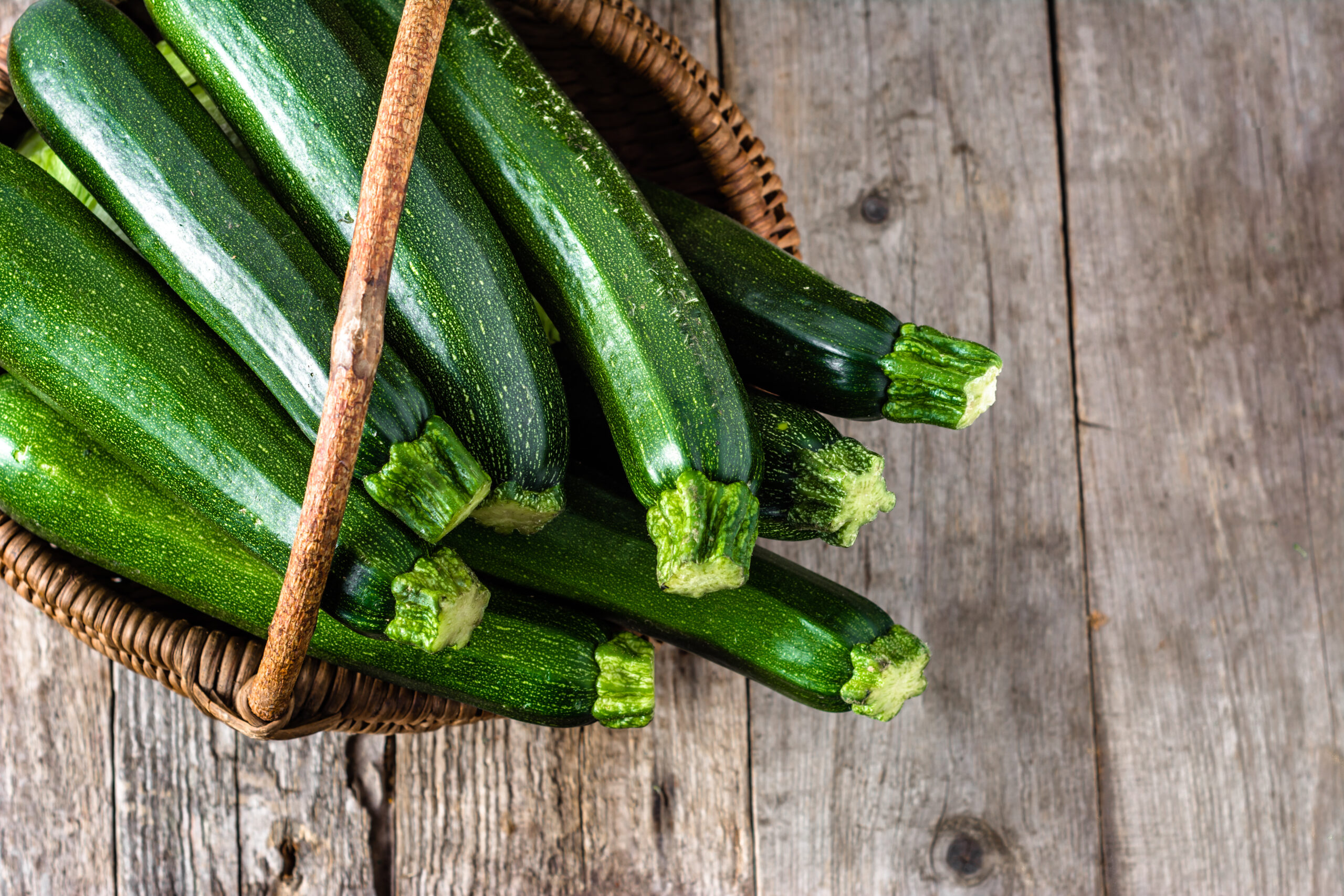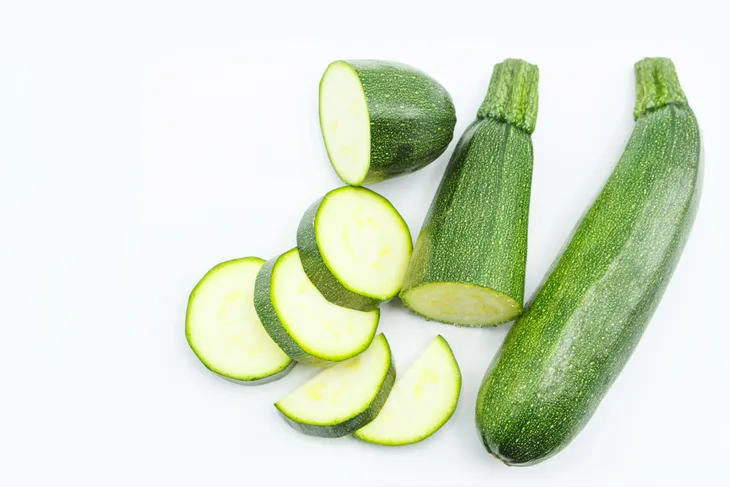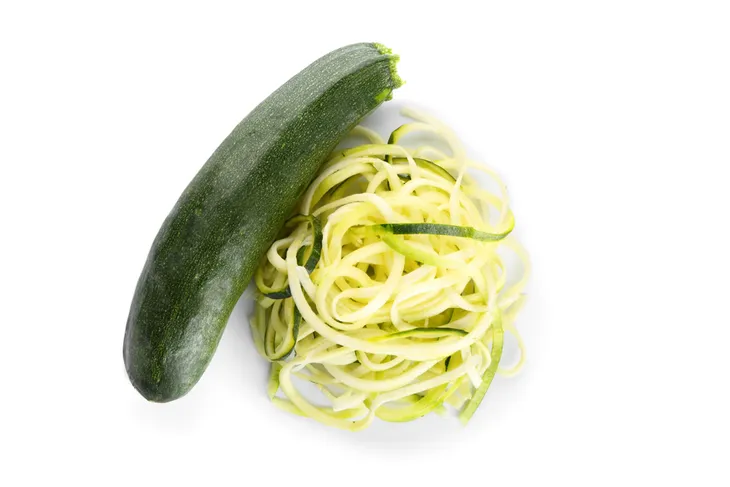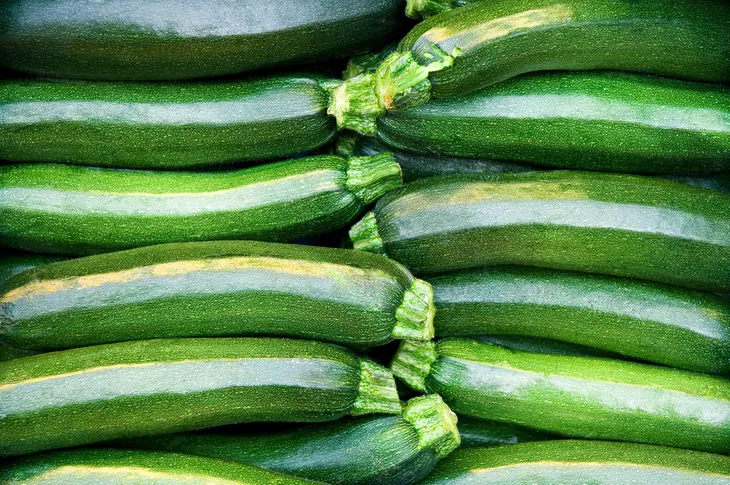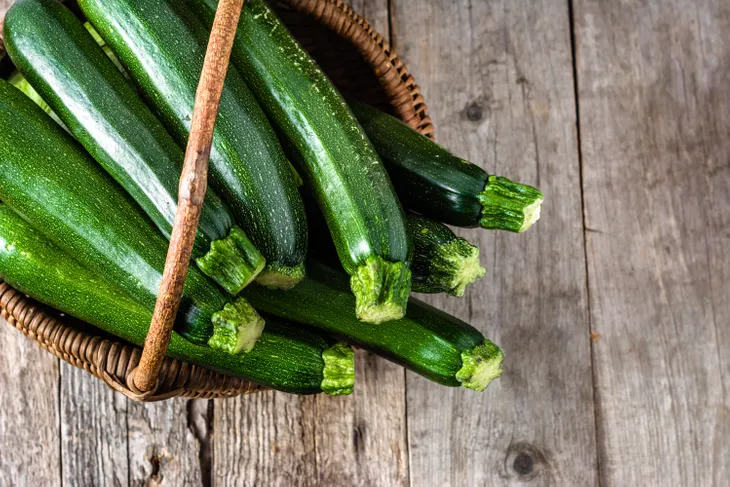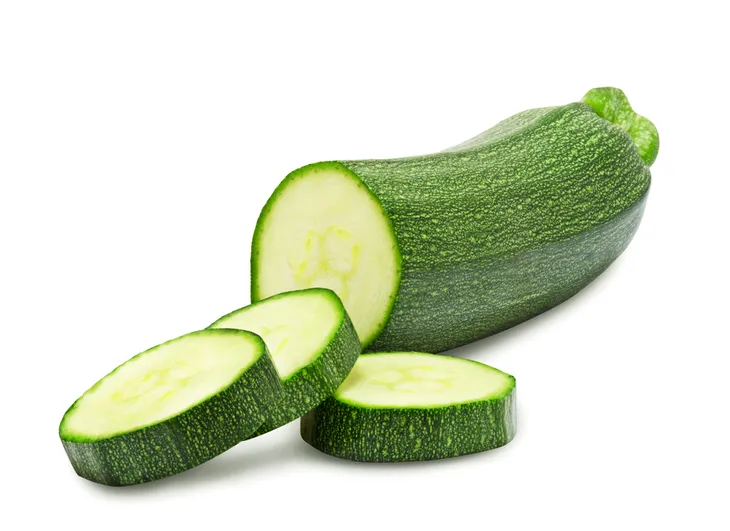You might think that a zucchini is related to the cucumber because they are so similar in appearance and taste, but it actually falls under the squash umbrella! Zucchini, also referred to as courgette in some parts of the world, is considered a summer squash which basically means it’s harvested before their rinds harden like a pumpkin or butternut squash.
One of the best things about zucchini is that it’s so versatile. You can eat it on it’s own, bake it into chips, slice it up and add it to stir-fry, cook into a lasagna, or even spiral it into noodles! No matter which way you slice it, one thing remains the same — it’s incredibly healthy! There are so many amazing health benefits that come from eating zucchini. Everything from weight loss to protecting against cancer. Here’s a look at the 12 most incredible health benefits of zucchini…
Aid in Weight Loss
One of the reasons zucchini is so good for weight loss is because it’s low-starch and super low in calories. According to Health.com, 1-cup of sliced zucchini is only 19-calories! That’s about half the calories in the same serving size as other vegetables like broccoli or Brussel sprouts. Not only is it low in calories, but it’s also high in fiber and water content which makes it good at keeping us feeling full for longer periods of time. Fiber helps us feel full which means we’re less prone to snacking or eating more throughout the day. In the long run this will help achieve weight loss.
Zucchini is considered to be a low glycemic food. “Increased intake of fruits and vegetables and low-fat foods has been linked to healthy weight loss and weight maintenance,” writes StyleCraze. The same source also points out that high-fiber foods tend to require more chewing which also deters us from eating more because we have to take our time to eat.
Good for the Heart
This summer squash veggie is also high in vitamin C which “may help the lining of your blood cells function better, lowering blood pressure, and protecting against clogged arteries.” Not only is zucchini high in vitamin C, but it also has anti-inflammatory properties that give it the ability to lower cholesterol.
Like other similar squashes, zucchinis are made up mostly of water and polysaccharides, which are a specific type of carbohydrates. They also contain a great deal of a fiber known as pectin which is a type of polysaccharides “which is a type of beneficial polysaccharide that is linked to improved cardiovascular health,” explains Dr. Axe. This type of fiber is also found in apples and pears and has the ability to not only improve arterial health, but also lower the risk of disease-causing inflammation.
In addition to all that, we already discussed how zucchini can be helpful with weight loss which can also have a positive impact on heart health. Obesity and heart disease are often linked, so if zucchini can help shed some pounds, it’ll also inadvertently work to lower the risk of heart disease.
Improve Digestion
Zucchini is often suggested for people who suffer from digestive conditions like diverticulitis because they are not only hydrating, but are a good source of nutrients and electrolytes. We’ve already mentioned that it also has anti-inflammatory properties which work to protect the gastrointestinal tract and help reduce IBS, leaky gut, and ulcer-related symptoms, explains Dr. Axe. “Eating anti-inflammatory foods, such as plenty of non-starchy fresh vegetables, is the first step to lowering body-wide inflammation and gut-related issues.”
Since zucchini is largely made up of water, it’s easy to digest which is a necessity for people who suffer from digestive problems. Their high fiber content also helps relieve constipation and treat diarrhea. Dr. Axe suggests eating the entire vegetable, including the skin and seeds in order to get the most out of its benefits.
Maintain Eye Health
Because zucchini is a type of squash, it reaps the benefits that all squash provide which is that it’s loaded with phytonutrients, like vitamin C, manganese, beta-carotene, lutein, and zeaxanthin, which all contribute to good eye health. The two main phytonutrients that zucchinis contain are lutein and zeaxanthin.
According to Dr. Axe, these are two types of carotenoid antioxidants which help defend against age-related eye diseases like macular degeneration, cataracts and glaucoma. “They work by protecting the retina, cornea and macula from UV light damage and oxidative stress that can lead to loss of vision and even blindness,” writes the source.
Good for Thyroid Health
Don’t ever peel your zucchini because the nutrients in the skin may be able to improve thyroid health! Dr. Axe cites a 2008 study by the Endocrine Research Unit at Devi University in India which found that “a high presence of polyphenols and ascorbic acid in extracts taken from the peel of zucchini and other squash vegetables.
When the researchers tested the effects of using these extracts in rat studies, the group supplementing with squash extract showed beneficial effects in regard to thyroid, adrenal and” the hormone that regulates glucose in the blood, explains Dr. Axe. The researchers drew the conclusion that these benefits came from the “antioxidant effects of squash’s phytonutrient chemicals.”
May Help Control Diabetes
One of the best ways to manage and prevent type 2 diabetes is a healthy diet. Zucchini is such a great snack or meal for any diabetic because it’s low in carbs and sugar, but is still filling and full of nutrients, says Dr. Axe. It’s also a low glycemic food which helps control blood sugar levels and regulate the amount of glucose in the blood. “The polysaccharide fibers found in zucchini nutrition and other squash, including pectin, have special benefits for blood sugar regulation,” writes the source.
We already talked about how zucchini can encourage weight loss which makes it a great preventative measure for diabetes as well. The source explains that research has shown a high-fiber diet can be the most simple and effective approach to warding off diabetes. StyleCraze cites a German study which found that insoluble fiber, the same kind that is found in zucchini, can be effective in preventing type 2 diabetes. It also cites another study published in the Journal of Nutrition which also found that insoluble fiber can reduce the risk of diabetes.
Good Source of Potassium
The American Heart Association explains that potassium is important for our overall health because it can help control blood pressure because it helps lower the effect of sodium on the body. “Studies suggest boosting your potassium intake (while also curbing sodium) can slash your stroke risk and may also lower your odds of developing heart disease,” writes Health.com. Luckily, just 1-cup of potassium will provide more that 15-percent of the recommended daily amount of potassium, says Dr. Axe. This is more than the average multivitamin supplement!
There are many benefits to increasing levels of potassium. For starters, people who are low in potassium have been found to be at a higher risk for heart disease and other complications. It’s also a natural way to lower blood pressure and counteract the negative side effects of a high-sodium diet. “Increasing potassium intake can slash your stroke risk and may also lower your odds of developing heart disease,” suggests Dr. Axe.
Slows Aging Process
Aging is something none of us can escape. It will eventually catch up to all of us at some point, but we must admit, it seems that some people age a little more “friendly” than others. A lot of that has to do with lifestyle, including diet. Toxins, free radicals and inflammation are what contribute to aging and can be reduced through anti-inflammatory foods like zucchini. This is because zucchinis are rich in antioxidants and anti-inflammatory phytonutrients which help “rid the body of free radicals and excess inflammation,” writes Food Revolution Network.
LiveStrong also points out that zucchinis contain manganese which is what “protects your tissues from harmful free radicals” and helps the body produce collagen which is what keeps the skin nice and tight, also known as wrinkle-free!
Protect Against Colon Cancer
Yet again, this benefit is due to zucchini’s high fiber content. Fiber is extremely important for our body, especially our digestive system because it’s what keeps us regular! According to StyleCraze, fiber also protects us from colon cancer. “It absorbs the excess water in the colon, retains enough moisture in the fecal matter, and helps it to pass smoothly out of the body. Because of all this, fiber works beautifully well in preventing colon cancer,” writes the source. The source also notes that dietary fiber as a whole protects us from colorectal cancer by reducing our risk.
A study published in the Gastroenterology Clinics of North America found that dietary fiber regulates “normal intestinal functioning and maintains a healthy mucus membrane of the intestine. Through the exact amount of fiber and the type is still not clearly known, an expert panel from the study had recommended a fiber intake of 20- to 35-grams per day to prevent colon cancer.”
Strengthen Bones
We’ve always been told that if we want to grow up with good strong bones we need to drink lots of milk because it’s loaded with calcium. It turns out there are many other ways to strengthen bones, like by eating zucchini. There are lots of nutrients in zucchini that not only encourage bone growth, but also keep bones nice and strong. This vegetable contains lutein and zeaxanthin which keep bones and teeth nice and strong, improve blood cells, and zucchini contains vitamin K which also enhances bone strength.
On top of all that, zucchini contains magnesium which “works along with calcium to improve muscle contraction,” and folate protects the bones, as well as beta-carotene. Lastly, “zucchini contains phytochemicals such as indoles, which, according to Rutgers Cancer Institute of New Jersey, maintain strong bones and teeth,” writes the source. That’s a whole lot of strong reasons to start eating more zucchini!
Promotes Healthy Pregnancy
A pregnant woman or someone trying to get pregnant should be doing all they can to stay healthy, especially when it comes to diet. Research has found that dark green vegetables like zucchini are among the best for promoting a healthy pregnancy.
Zucchini offers a ton of great nutrients and B-complex vitamins that help maintain energy levels and regulate mood throughout pregnancy. It’s also rich in folic acid which is important for the development of a healthy baby. Folic acid “has shown to reduce the risk of certain birth defects like spina bifida (the baby’s spinal cord doesn’t develop properly) and anencephaly (absence of a major portion of the brain),” writes StyleCraze.
The source also explains that folate helps a woman produce red blood cells which reduces the risk of development problems during the pregnancy.
Boost Energy
Everyone needs a good energy boost every now and again, and most of us turn to caffeine to get it. Food Revolution Network notes that zucchini can be beneficial in boosting energy because it’s “a rich source of B-vitamins, especially folate, riboflavin, and B6, it can help to boost energy production in the body.” These nutrients help reduce fatigue and improve mood.
